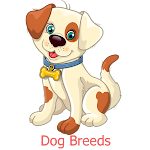 |
| flat-coated retriever |
The flat-coated retriever is a well-kept secret of the dog world. Often overshadowed by other more popular breeds like the Labrador or Golden Retriever, this breed is a hidden gem that deserves more recognition. With its cheerful disposition, boundless energy, and adaptability, the flat-coated retriever makes for an excellent companion for families and individuals alike. In this article, we will delve into the history, characteristics, and care of this lovable breed, and why it should be on the radar of any dog lover.
History
The flat-coated retriever, as the name suggests, was originally developed in England as a gun dog for retrieving game on land and in water. The breed is believed to have descended from various retriever and spaniel breeds, including the St. John's water dog, Newfoundland, and possibly Collie and Setter. The flat-coated retriever's popularity soared in the late 19th and early 20th centuries, as it was favored by sportsmen for its versatility and skill in retrieving game. However, its numbers declined during the two World Wars, but dedicated breed enthusiasts helped to preserve and promote the breed, ensuring its survival and continued popularity today.
Characteristics
The flat-coated retriever is known for its distinct, sleek black or liver-colored coat, which lies flat against the body. They have a friendly and outgoing temperament, making them a hit with families and individuals. This breed is highly intelligent, trainable, and with a natural willingness to please, which makes them excel in various dog sports and activities such as obedience, agility, and retrieving trials. They are also known for their boundless energy and need for regular exercise, which makes them an excellent choice for active individuals or families with an active lifestyle. Their love for water and swimming is a testament to their origin as a waterfowl retriever, so they are always up for a dip in the pool or a lake.
Care and Maintenance
The flat-coated retriever's coat requires regular grooming to keep it in top condition. Weekly brushing is essential to prevent matting and remove loose hair, while regular baths are also necessary to keep their coat clean and fresh. As with any dog, regular dental care, nail trimming, and ear cleaning are also crucial for their overall health and well-being. Additionally, because of their high energy levels, regular exercise and mental stimulation are vital for a happy and content flat-coated retriever. Long walks, runs, and interactive playtime are a must to keep them physically and mentally satisfied.
Conclusion
The flat-coated retriever may be a well-kept secret, but it's a secret that deserves to be shared. This breed's loving nature, intelligence, and versatility make it an excellent choice for anyone looking for a loyal and active companion. Whether you're an experienced dog owner or a first-time pet parent, the flat-coated retriever is a breed that is worth considering and welcoming into your home. With proper care, training, and plenty of love and attention, this lovable breed will surely bring joy and happiness to your life for years to come.
YOU MAY LIKE:
The 10 Dogs Breeds with the Longest LifespansThe 10 Fluffiest Dog Breeds
The 10 Fluffiest Dog Breeds
The 10 Healthiest Dog Breeds
The 10 Least Aggressive Dog Breeds
The 10 Dog Breeds with the Strongest Bite Force
The 10 Dog Breeds with Webbed Feet
The 10 Dogs Breeds with the Longest Lifespans
FAQs
Are flat-coated retrievers good with children?
Yes, flat-coated retrievers are known for their affectionate and friendly nature, making them great companions for children. However, as with any dog, it's important to supervise interactions between dogs and children and teach children how to properly behave around dogs.
Do flat-coated retrievers have any health issues?
Like all breeds, flat-coated retrievers can be prone to certain health issues such as hip dysplasia, cancer, and epilepsy. Regular veterinary check-ups, a healthy diet, and regular exercise can help to mitigate the risk of these health concerns.
How much exercise do flat-coated retrievers need?
Flat-coated retrievers are high-energy dogs and require regular, daily exercise. A mix of physical activities such as long walks, runs, and interactive playtime, as well as mental stimulation through training and enrichment activities, are essential to keep them happy and healthy.
Are flat-coated retrievers easy to train?
Yes, flat-coated retrievers are highly intelligent and eager to please, which makes them relatively easy to train. Consistent, positive reinforcement training methods work best with this breed, and early socialization and obedience training are important to ensure a well-behaved and well-adjusted pet.


